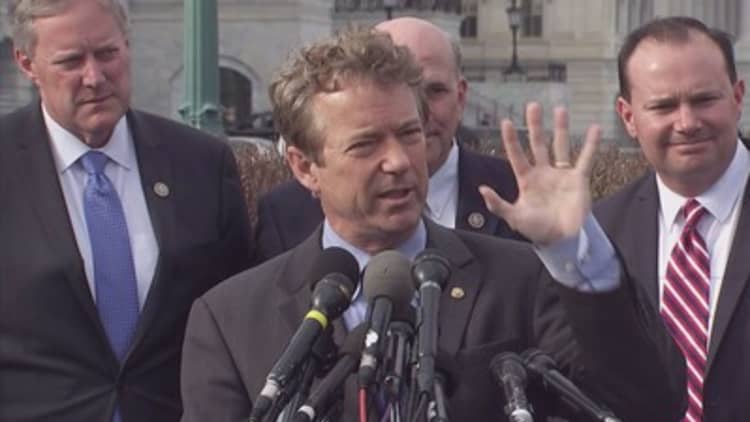As Congress heads home for a two-week Easter break, with Republicans at an impasse over an Obamacare replacement, health insurers are effectively operating in the dark at a crucial point in their planning for 2018 coverage.
"Insurers will have to decide very, very soon about pricing for next year," said S&P Global credit analyst Deep Banerjee, because initial rate submissions for Obamacare plans are due over the next couple of weeks in a handful of states.
"They're basically forced to make one of two choices: put in a surprise buffer — price higher than they would have for the risk in the market… or be more selective in participating in the counties or the states that they're in," Banerjee said.
In Iowa this week, the answer was the latter. Aetna and Iowa Blue Cross insurer Wellmark announced that they are pulling out of the state's Obamacare market in 2018. The state's two largest exchange insurers cited the lack of market clarity for the decision.
"We need Congress to act," said Nick Gerhart, chief administrative officer at FBL Financial. "One of the reasons Aetna got out was because of the uncertainty."

Gerhart, who served as Iowa's insurance commissioner from 2013 to 2016, worries some counties in his state may be left with no insurance coverage in the wake of Wellmark and Aetna pulling out of the state.
"Right now, Medica is in every county in Iowa," he said. "They're a good insurance company out of Minnesota, with a decent balance sheet. But, at the end of the day, that's a lot of risk to take on, as a single carrier in the state."
An S&P Global analysis of not-for-profit Blue Cross insurers on the Obamacare exchanges found that 75 percent saw an improvement in operating performance in 2016.
After raising premiums this year to better balance out their risks on older, sicker exchange enrollees, S&P expects many of the insurers will break even on Obamacare plans. But the uncertainty in Washington is throwing a wrench in the works.
"If you leave the market alone... the insurance companies can adapt very quickly, and they can decide based on the market fundamentals," said S&P's Banerjee. "As soon as there are external events, which are beyond their control, it's harder for them to make decisions like pricing and product."
One of the biggest unanswered questions for insurers has to do with Obamacare subsidies that help low-income enrollees with out-of-pocket costs. The so-called Cost-Sharing Reduction payments are at the heart of a House lawsuit brought against the Obama administration.
House Speaker Paul Ryan said this week that the House will not push the Trump administration to end the payments this year, but he added that the lawsuit will continue.
If the Republicans choose to cut the CSRs for 2018, insurers would have to raise premiums by nearly 20 percent for next year to compensate for the lost revenue, according to researchers at the Kaiser Family Foundation.
This year, five states and one-third of the nation's counties have just one insurer in the individual market. With so much up in the air, there is increasing concern that insurers could pull back, leaving some of those areas without insurance options for 2018. And there's very little regulators can do to force them to provide coverage.
"If there's no insurance, there's no insurance," said Gerhart. "I think seven to 10 states are going to be in this boat."
Watch: Ryan says Congress closer to health care agreement



